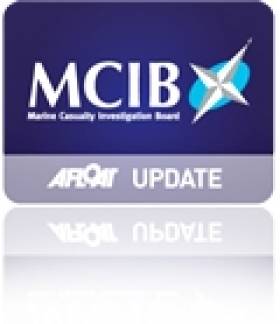Displaying items by tag: Jeanette Roberta
Marine Notices on Vessel Maintenance and Accessibility
#MarineNotice - A recent Marine Notice from the Department of Transport, Tourism and Sport (DTTAS) raises importance of maintenance as highlighted in the MCIB report into the scuttling of fishing vessel Jeanette Roberta in Glandore Harbour in late 2011.
As previously reported on Afloat.ie, the prawn boat was returning to port on 11 December 2011 when the skipper had difficulty switching the helm from auto-pilot to manual due to a known issue with "sticky solenoids". The boat subsequently veered off course without warning and was holed on rocks on Adam's Island.
The official report into the incident castigated the owner/skipper for continuing to sail the vessel with persistent navigation issues - and Marine Notice No 04 of 2013 reminds all fishing vessel operators to ensure that deficiencies with their vessels are rectified without delay.
It is the responsibility of the owner to ensure that a vessel is maintained and operated at all times in accordance with the requirements of the agreed Code of Practice. Owners of all vessels also have a legal obligation to operate their vessels in accordance with the law.
Meanwhile, the latest Marine Notice is directed at passenger vessel owners and operators - encouraging them to continue voluntary efforts to improve accessibility on their vessels.
A new questionnaire has been made available to inform the DTTAS about the extent of accessibility improvements introduced to maritime passenger transport services in the State.
Full details are included in Marine Notice No 05 of 2013, a PDF of which is available to read or download HERE.
Safety Measures Highlighted In Report On Angler's Death
#MCIB - The Marine Casualty Investigation Board (MCIB) has again advised recreational boat users to prioritise safety while on the water following the death of an angler on Lough Corrib earlier this year.
Clarifying the story previously reported on Afloat.ie, Michael Ruane died by drowning after he and angling partner Donal Coyle were knocked overboard from their small craft when it heeled over on a large wave off Annaghdown on 19 March 2012.
Coyle was treated for hypothermia after an unsuccessful attempt to search for his colleague, whose body was recovered by the Irish Coast Guard more than two hours after he entered the water.
The MCIB report into the incident found that the revolving seat used by one of the two men on board meant that "both his height above the gunwale and his position right forward may have had an influence on the handling and stability of the boat", which was not compliant with the EU Recreational Craft Directive.
It also found that while both were wearing personal flotation devices (PFDs), they were only loosely fitting - explaining why Ruane became separated from his lifejacket shortly after going overboard.
Moreover, the kill cord on the boat's engine was not used by either man, which caused them to be separated from their vessel. "The consequence of this," the report said, "was a long period of immersion in cold water which led to the death of one of the men and hypothermia of the other".
There was also a delay of more than an hour in raising the alarm as the men in the water had no means to indicate their distress. Coyle had a mobile phone but it was rendered useless by immersion.
The MCIB has recommended that owners and operators of recreational craft should be aware and follow the Department of Transport, Tourism and Sport’s (DTTAS) Code of Practice for the Safe Operation of Recreational Craft. The complete report is available to download below.
Meanwhile, problems with the auto-pilot system were judged to be the trigger of events that caused the scuttling of fishing vessel Jeannete Roberta in Glandore Harbour last December.
The prawn boat was returning to port on 11 December 2011 when the skipper had difficulty switching the helm from auto-pilot to manual due to a known issue with "sticky solenoids".
While the skipper addressed that issue, the boat suddenly altered course without warning - another issue known to occur randomly - and was holed on rocks on the southern side of Adam's Island before eventually sinking.
While castigating the owner/skipper for continuing to sail the vessel with persistent navigation issues, the MCIB also noted that all six crew survived the incident uninjured, finding that all stayed calm and organised as they abandoned ship, and that all safety and communications equipment functioned as required.

























































